our solar system and me...
I was born in Boston and spent my earliest childhood right outside of there in a town called Newburyport and an even smaller hamlet called Amesbury. When I was 3 my mother moved us to San Francisco to escape the company of crazy-in-a-bad-way people. (San Francisco was not a great choice in that regard) and it was there I spent the rest of my early childhood. Picture it: San Francisco, 1973....I have a lot to share about that at a different time. For now, I want to share about the crazy-in-a-good-way school I attended. Named for the "Elven" dwelling, Rivendell, this school was neither typical nor conventional---shocker! (I even had a classmate named Aragorn.) One of the basic educational tenets of Rivendell was to not impose education on children--that the child will learn when the child wants to (which in my case was never.) Therefore, I learned how to make Gods-eyes but I not how to read. I learned how to make macaroni jewelry but not write. I learned how to make sand candles on the beach, but not math. In fact, I had quite a collection of Gods-eyes, macaroni necklaces and sand candles and absolutely no interest in reading, writing or arithmetic. Well, that is not entirely true. I wanted to already know how to read and write but I did not want to learn to read. and write. (This would become a disturbing pattern in my life later on and one I would hard work to correct.)
So, instead of sitting in a chair, I ran around naked painting the walls (that is right! Remember, 1973 SAN FRANCISCO--I was not the only one!) I watched sugar-crystals grow on threads in glass jars. I drew pictures, ate apples and peanut butter and pretended to be in Star Wars (later--not 1973) I did NOT, however, sit still long enough to read, write or calculate anything. In fact I would not do any of this until I was 9 years old and put in a different type of school--"Public". (DUN dun dun....)
BUT there was ONE thing--not artsy per se-- I DID slow down for: anytime, anyone, anywhere talked about space, the solar system, planets, stars or rocketships, I would put my clothes on, I would even sit in a chair if I had to, and I would look and listen and ponder. Space. The coolest thing EVER.
I learned a lot at Rivendell, most of it non-academic. The one thing they taught me that I have never forgotten is how to remember the order of planets using a little ditty they would sing while strumming on a guitar:
So, instead of sitting in a chair, I ran around naked painting the walls (that is right! Remember, 1973 SAN FRANCISCO--I was not the only one!) I watched sugar-crystals grow on threads in glass jars. I drew pictures, ate apples and peanut butter and pretended to be in Star Wars (later--not 1973) I did NOT, however, sit still long enough to read, write or calculate anything. In fact I would not do any of this until I was 9 years old and put in a different type of school--"Public". (DUN dun dun....)
BUT there was ONE thing--not artsy per se-- I DID slow down for: anytime, anyone, anywhere talked about space, the solar system, planets, stars or rocketships, I would put my clothes on, I would even sit in a chair if I had to, and I would look and listen and ponder. Space. The coolest thing EVER.
I learned a lot at Rivendell, most of it non-academic. The one thing they taught me that I have never forgotten is how to remember the order of planets using a little ditty they would sing while strumming on a guitar:
"my very educated mother, Just served us nine pizza-pies"
But it was more musical, prettier, like this:
(Turns out, after much hullabaloo trying to figure out the 16 notes to my childhood ditty, it is Suwanee River, originally titled Old Folks at Home by E.P. Christy**)
This was how I came to memorize the order of the planets. If only there was a song for everything. (There probably is.)
This was how I came to memorize the order of the planets. If only there was a song for everything. (There probably is.)
NOTE:
This page is going to be under constant construction. I am not just interested in focusing on Western world-views; I just started with what was most familiar. I will be adding different mythologies, cosmologies, philosophies, spiritualities and sciences from all over, as time goes on.
This page is going to be under constant construction. I am not just interested in focusing on Western world-views; I just started with what was most familiar. I will be adding different mythologies, cosmologies, philosophies, spiritualities and sciences from all over, as time goes on.
The Line-up
my
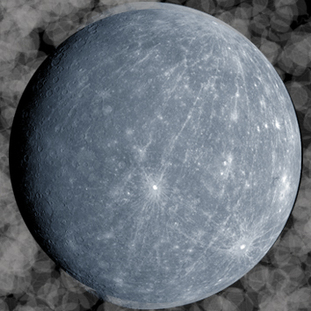
Mercury
Tiny Mercury is the smallest planet in our solar system and the closest to the Sun. However, many years ago a French Mathematician asserted that Mercury's orbit was not quite in line with Newtonian law and surmised that there might be another, smaller planet between Mercury and the Sun. (Neptune had been similarly "discovered" by suspicious readings of Uranus's orbit.) So, the scientists did what any 8 year-old girl would do, they named the planet before checking to see if it was there. Vulcan has yet to be found--and it is considered highly unlikely that ever will be. I am pleased, however, that they did not break with tradition (I can be sentimental) and chose a God's name to honor this imaginary planet--in this case the God of Fire.
(That's right all you Trekkies who think the world started in 1966--the planets Vulcan and Romulus, not to mention numerous starships and other aliens--all named after "real mythological" figures.)
They ended up giving the name Vulcan to one of Pluto's moons--the name was too good to waste, I guess.
Mercury's surface resembles the moon and is generally thought to be geologically dormant. In 2012, however, NASA's Messenger detected craters of ice at the north pole--huge craters of ice.. (I may need to hop over to Mercury and procure some water for Mars. Otherwise, my tomatoes are not going to be happy......) Seriously, though, water is a seriously serious discovery. And quite amazing.
1 Mercury day= 59 Earth days
Tiny Mercury is the smallest planet in our solar system and the closest to the Sun. However, many years ago a French Mathematician asserted that Mercury's orbit was not quite in line with Newtonian law and surmised that there might be another, smaller planet between Mercury and the Sun. (Neptune had been similarly "discovered" by suspicious readings of Uranus's orbit.) So, the scientists did what any 8 year-old girl would do, they named the planet before checking to see if it was there. Vulcan has yet to be found--and it is considered highly unlikely that ever will be. I am pleased, however, that they did not break with tradition (I can be sentimental) and chose a God's name to honor this imaginary planet--in this case the God of Fire.
(That's right all you Trekkies who think the world started in 1966--the planets Vulcan and Romulus, not to mention numerous starships and other aliens--all named after "real mythological" figures.)
They ended up giving the name Vulcan to one of Pluto's moons--the name was too good to waste, I guess.
Mercury's surface resembles the moon and is generally thought to be geologically dormant. In 2012, however, NASA's Messenger detected craters of ice at the north pole--huge craters of ice.. (I may need to hop over to Mercury and procure some water for Mars. Otherwise, my tomatoes are not going to be happy......) Seriously, though, water is a seriously serious discovery. And quite amazing.
1 Mercury day= 59 Earth days
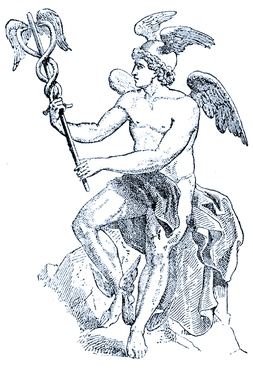
Hermes*
One of my favorite Gods. He is a super busy deity, running around all over the place guiding dead people to Hades, delivering messages and generally going where no other God or Goddess will go. (The word "hermeneutic" comes from Mercury for this reason--he goes beyond the outer layer of things and is willing to seek things that other's won't seek.) Usually thought of as young and athletic looking, Hermes has winged feet and a winged helmet--perfect accoutrements for a messenger God. He is the owner of the first caduceus. He was a key player in the Demeter-Persephone-Hades incident--for me one of the most important metaphors in Greek and Roman mythology.
Fun Facts: Hermes is not only a protector of merchants, shepherds, but of gamblers, liars, and thieves. (Thank you, Mercury!) And the caduceus is often incorrectly used as a symbol for healthcare, when it is the single-snaked, un-winged rod of Asclepius that is the actual representative for healthcare organizations.
One of my favorite Gods. He is a super busy deity, running around all over the place guiding dead people to Hades, delivering messages and generally going where no other God or Goddess will go. (The word "hermeneutic" comes from Mercury for this reason--he goes beyond the outer layer of things and is willing to seek things that other's won't seek.) Usually thought of as young and athletic looking, Hermes has winged feet and a winged helmet--perfect accoutrements for a messenger God. He is the owner of the first caduceus. He was a key player in the Demeter-Persephone-Hades incident--for me one of the most important metaphors in Greek and Roman mythology.
Fun Facts: Hermes is not only a protector of merchants, shepherds, but of gamblers, liars, and thieves. (Thank you, Mercury!) And the caduceus is often incorrectly used as a symbol for healthcare, when it is the single-snaked, un-winged rod of Asclepius that is the actual representative for healthcare organizations.
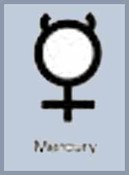
ASTROLOGY:
Mercury's winged helmet and caduceus.
Mercury's winged helmet and caduceus.
very
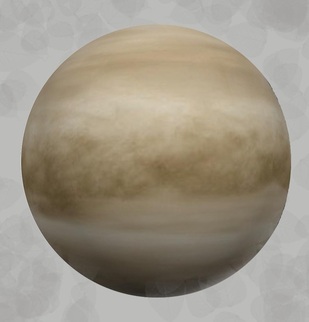
Venus
Venus, the second planet from the sun, is the the second brightest organic object in the night sky--capable even of casting shadows. Ancient cultures referred to Venus as both the Morning Star and the Evening Star as it reaches its maximum brightness shortly before sunrise and shortly after sunset.
Venus, being a terrestrial planet (A terrestrial planet, or telluric planet is a planet that is composed primarily of rocks or metals.) is often referred to as Earth's "sister planet"--but in reality, it is very different. Surprisingly, Venus is the hottest planet in our Solar System and has an atmospheric pressure 92 times that of Earth. The super-dense atmosphere is more than 96% carbon dioxide. Shrouded by an opaque layer of highly reflective sulphuric acid clouds prevents its surface from being seen from space in visible light.
At one point in time, and this is kind of exciting, Venus may have possessed actual oceans! They probably vaporized as temperatures rose due to a "runway" greenhouse effect.
This is a fun sentence full of big words:
Venus, the second planet from the sun, is the the second brightest organic object in the night sky--capable even of casting shadows. Ancient cultures referred to Venus as both the Morning Star and the Evening Star as it reaches its maximum brightness shortly before sunrise and shortly after sunset.
Venus, being a terrestrial planet (A terrestrial planet, or telluric planet is a planet that is composed primarily of rocks or metals.) is often referred to as Earth's "sister planet"--but in reality, it is very different. Surprisingly, Venus is the hottest planet in our Solar System and has an atmospheric pressure 92 times that of Earth. The super-dense atmosphere is more than 96% carbon dioxide. Shrouded by an opaque layer of highly reflective sulphuric acid clouds prevents its surface from being seen from space in visible light.
At one point in time, and this is kind of exciting, Venus may have possessed actual oceans! They probably vaporized as temperatures rose due to a "runway" greenhouse effect.
This is a fun sentence full of big words:
"The water has most probably photodisaccociated and , because of the lack of a planetary magnetic field, the free hydrogen has been swept into interplanetary space by the solar wind."
Basically, the high heat burned off the water at such a rapid rate that the evaporated hydrogen was swept out into space by solar winds. No more oceans.
Currently, Venus's surface is but a dry, desertscape with slabby rocks.
1 Venus day= 224.7 Earth days
Currently, Venus's surface is but a dry, desertscape with slabby rocks.
1 Venus day= 224.7 Earth days
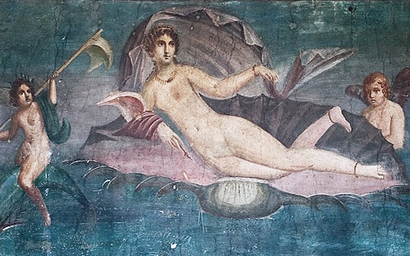
Aphrodite
Akin to the super-hot-popular girl at school, there is no head she cannot turn. Not my favorite Goddess (probably because of the popular aspect) but I have to give her props for being the honoree of the ONLY planet named for a Goddess, And, it is hard to imagine any American woman who hasn't wondered what it would be like to possess ideal beauty (and all the power that seems to come with it) at least once.
(I cannot say with any authority that the desire to embody Beauty is a universal thing, but if it is, it is likely that there is a primal survival mechanism triggered that allows for this.)
Venus likes to be the center of attention and gets very jealous at any human compared to her, in competition with her, or not in love with her. She is wiley and cunning and you do not want to mess with the Goddess. Venus seems to be less about love and more about primal lust.
(Plus, she had the hots for Mars. Like me.)
(Venus and Aphrodite do embody our different relationships to different kinds of love--and between the two of them, we pretty much cover all the bases.*)
Fun Facts: You know Botticelli's famous painting of Venus rising out of the sea? Right before that beautiful scene Cronos (Saturn) cut the Mega-God Caelus's (Uranus's) penis off and tossed it into the ocean. It is out of this Titan penis that Venus is "born."
Mythology! Can't get enough of it!
Akin to the super-hot-popular girl at school, there is no head she cannot turn. Not my favorite Goddess (probably because of the popular aspect) but I have to give her props for being the honoree of the ONLY planet named for a Goddess, And, it is hard to imagine any American woman who hasn't wondered what it would be like to possess ideal beauty (and all the power that seems to come with it) at least once.
(I cannot say with any authority that the desire to embody Beauty is a universal thing, but if it is, it is likely that there is a primal survival mechanism triggered that allows for this.)
Venus likes to be the center of attention and gets very jealous at any human compared to her, in competition with her, or not in love with her. She is wiley and cunning and you do not want to mess with the Goddess. Venus seems to be less about love and more about primal lust.
(Plus, she had the hots for Mars. Like me.)
(Venus and Aphrodite do embody our different relationships to different kinds of love--and between the two of them, we pretty much cover all the bases.*)
Fun Facts: You know Botticelli's famous painting of Venus rising out of the sea? Right before that beautiful scene Cronos (Saturn) cut the Mega-God Caelus's (Uranus's) penis off and tossed it into the ocean. It is out of this Titan penis that Venus is "born."
Mythology! Can't get enough of it!
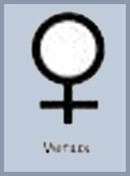
ASTROLOGY:
Venus's hand mirror.
Venus's hand mirror.
educated
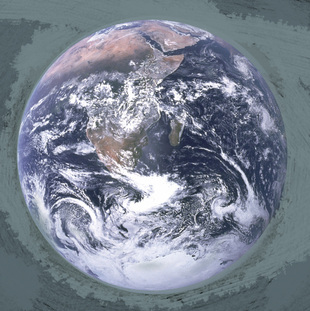
Earth
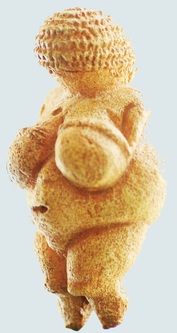
It makes sense that in the West all of the planets, with the exception of Earth, were named for Gods and Goddesses (in this case, Roman)--after all, they were the original occupants of the sky. Planets that could be viewed sans telescope were, of course, named first. By the time the other, more distant planets were observed, Western science simply kept with tradition and continued to name them after the Divine.
The name Earth seems to have a less mysterious connotation--"ground" or, strangely, "the opposite of the sea."But we humans have another word for the planet Earth and that is "world." Earth is our world. The cosmology behind this was that Earth was where we lived, but the world was where we existed. Like actors in a play--the stage set was not as "real" as the actors occupying it--a delineation between the material and the spiritual planes of existence.. Living in the "World" references a plane of existence which is different than simply living on the "Earth."
The name Earth seems to have a less mysterious connotation--"ground" or, strangely, "the opposite of the sea."But we humans have another word for the planet Earth and that is "world." Earth is our world. The cosmology behind this was that Earth was where we lived, but the world was where we existed. Like actors in a play--the stage set was not as "real" as the actors occupying it--a delineation between the material and the spiritual planes of existence.. Living in the "World" references a plane of existence which is different than simply living on the "Earth."

ASTROLOGY:
Globe with equator and meridian.
Globe with equator and meridian.
mother
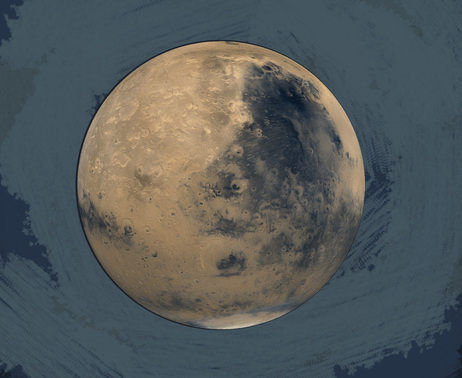
Mars
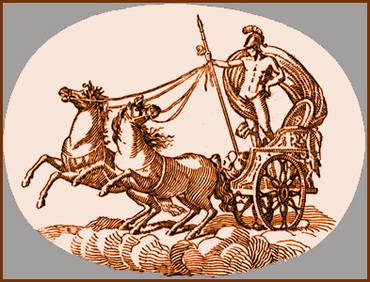
Ares
The planet of the hour. Most popularly known for being the God of War, he is hot-tempered, fiery, lusty and tempestuous (unlike all the other mellow, easy-going Gods.)
I have noted below that the Greek and Roman Gods are different, but have become fused in modern culture. Ares and Mars do have some very vast differences that I feel compelled to mention--but only because everything in my life is all about Mars these days.
While Ares represents the violent untamed aspect of war, and seen as a dangerous force, Mars was regarded as more dignified and even guardian-like. Zeus often viewed Ares as hateful, as did the Greek citizens, but Mars was more honored and respectable. And, to make matters worse for Ares, seen as all-violent all the time guy, he was on the losing side of the Trojan war, beaten by Athena, Goddess of military stratagem. If Ares weren't at least the best at the most horrific aspects of existence, what kind of God of War was that? Ares tales were often filled with the God being humiliated and wrong.
(Side note: This reminds me of Worf in Star Trek: The Next Generation. If you look at each character on the Enterprise as representative as a facet of the Human Condition [which is really how the Greek and Roman Gods and Goddesses operate] Worf always represented Conflict, Judgement, Violence and Valor. BUT, being a huge fan of that show and watching it way more than was healthy, I noted a pretty obvious pattern: Worf was always wrong. Almost 100% of the time. If you knew what Worf thought, you knew what wasn't going to end up being true. The spectrum opposite of this, of course, was Picard who, you might have guessed, was always right.
Did this make make Worf less lovable? Not at all! Did this prevent me from having a sex dream about him when I was in college? Nope! And did this make him less useful to the whole when he was needed? Not at all. It's just that TNG Star Trek was less cowboy/vigilante justice and more Zen/Buddhist justice. Worf probably would have been right more often on the Original series.)
Fun Facts: Mars and Venus, in their on-again/off-again love affair, begat the irascible Eros--God of Love, Desire and Sex. However, this is disputed and some believe that Eros is a "Primordial" God (meaning without parents)and one of the First Four Gods to ever exist.
AND
Two of Mars' other children are named Panic and Fear. (If those guys show up on the planet, we might be screwed!)
The planet of the hour. Most popularly known for being the God of War, he is hot-tempered, fiery, lusty and tempestuous (unlike all the other mellow, easy-going Gods.)
I have noted below that the Greek and Roman Gods are different, but have become fused in modern culture. Ares and Mars do have some very vast differences that I feel compelled to mention--but only because everything in my life is all about Mars these days.
While Ares represents the violent untamed aspect of war, and seen as a dangerous force, Mars was regarded as more dignified and even guardian-like. Zeus often viewed Ares as hateful, as did the Greek citizens, but Mars was more honored and respectable. And, to make matters worse for Ares, seen as all-violent all the time guy, he was on the losing side of the Trojan war, beaten by Athena, Goddess of military stratagem. If Ares weren't at least the best at the most horrific aspects of existence, what kind of God of War was that? Ares tales were often filled with the God being humiliated and wrong.
(Side note: This reminds me of Worf in Star Trek: The Next Generation. If you look at each character on the Enterprise as representative as a facet of the Human Condition [which is really how the Greek and Roman Gods and Goddesses operate] Worf always represented Conflict, Judgement, Violence and Valor. BUT, being a huge fan of that show and watching it way more than was healthy, I noted a pretty obvious pattern: Worf was always wrong. Almost 100% of the time. If you knew what Worf thought, you knew what wasn't going to end up being true. The spectrum opposite of this, of course, was Picard who, you might have guessed, was always right.
Did this make make Worf less lovable? Not at all! Did this prevent me from having a sex dream about him when I was in college? Nope! And did this make him less useful to the whole when he was needed? Not at all. It's just that TNG Star Trek was less cowboy/vigilante justice and more Zen/Buddhist justice. Worf probably would have been right more often on the Original series.)
Fun Facts: Mars and Venus, in their on-again/off-again love affair, begat the irascible Eros--God of Love, Desire and Sex. However, this is disputed and some believe that Eros is a "Primordial" God (meaning without parents)and one of the First Four Gods to ever exist.
AND
Two of Mars' other children are named Panic and Fear. (If those guys show up on the planet, we might be screwed!)
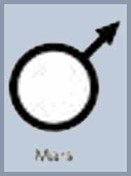
ASTROLOGY:
Mars' shield and spear.
Mars' shield and spear.
just
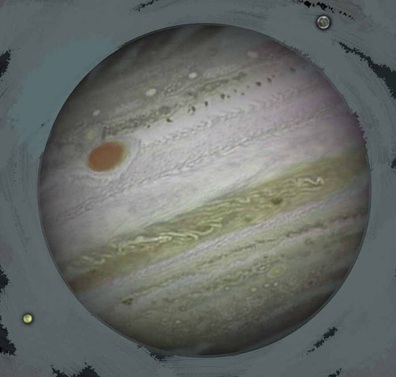
Jupiter
Jupiter, the fifth planet from the Sun and the largest in our Solar System is a Gas Giant (don't let Zeus hear you say that). Luckily, though, Jupiter is not alone in its gassiness--Saturn, Uranus and Neptune are also gassy, making the up what is referred to as the Jovian Planets. (Jovian simply means "pertaining to Jupiter").
Strangely enough, Jupiter can be bright enough cast shadows on Earth, making it the third brightest organic object (after the moon and Venus) in the night sky. Mars, clearly closer to Earth than Jupiter, can only match Jupiter's brightness at certain orbital points.
Jupiter has a rocky core of heavy elements, but lacks a well-defined solid surface. Because of this lack of surface definition, the shape of the planet is what is known as an "oblate spheroid" (kind of bulgier around the equator). The outer atmosphere, visibly segregated into several bands at different latitudes, creates storms and turbulence at their interacting boundaries. The most noticeable of all these is "The Great Red Spot", a giant anti-cyclonic storm system. Jupiter also has a very faint planetary ring (like Saturn) that is not hugely visible. There are at least 67 moons, the most noted being the four Galilean moons that were discovered by, you guessed it, Galileo. The four are named: Ganymede, Io, Callisto and Europa.
Fun fact: Robotic spacecraft have actually traversed the distance between Earth and Jupiter and done fly-by investigations. Most recently, a probe destined to visit Pluto in 2007, used Jupiter's gravity to slingshot itself towards its final destination.
1 Jupiter day= 11.9 Earth years
Jupiter, the fifth planet from the Sun and the largest in our Solar System is a Gas Giant (don't let Zeus hear you say that). Luckily, though, Jupiter is not alone in its gassiness--Saturn, Uranus and Neptune are also gassy, making the up what is referred to as the Jovian Planets. (Jovian simply means "pertaining to Jupiter").
Strangely enough, Jupiter can be bright enough cast shadows on Earth, making it the third brightest organic object (after the moon and Venus) in the night sky. Mars, clearly closer to Earth than Jupiter, can only match Jupiter's brightness at certain orbital points.
Jupiter has a rocky core of heavy elements, but lacks a well-defined solid surface. Because of this lack of surface definition, the shape of the planet is what is known as an "oblate spheroid" (kind of bulgier around the equator). The outer atmosphere, visibly segregated into several bands at different latitudes, creates storms and turbulence at their interacting boundaries. The most noticeable of all these is "The Great Red Spot", a giant anti-cyclonic storm system. Jupiter also has a very faint planetary ring (like Saturn) that is not hugely visible. There are at least 67 moons, the most noted being the four Galilean moons that were discovered by, you guessed it, Galileo. The four are named: Ganymede, Io, Callisto and Europa.
Fun fact: Robotic spacecraft have actually traversed the distance between Earth and Jupiter and done fly-by investigations. Most recently, a probe destined to visit Pluto in 2007, used Jupiter's gravity to slingshot itself towards its final destination.
1 Jupiter day= 11.9 Earth years
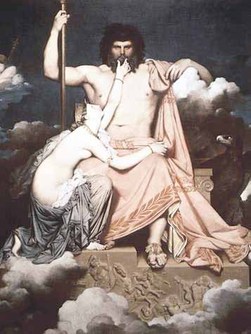
Zeus
Jupiter is the Father of All and King of the Universe. He can be a little rapey and the lists of his "consorts" goes on and on and one and on. And on. Officially known as the God of the sky, lightning, thunder, law, order and justice--he is also a producer of chaos in his own right. He is usually depicted perched on his throne with his royal accoutrements or standing mightily clutching his thunderbolt.
When the Cosmos was being divvied up, after the rebellion against the Titans, Zeus, Poseidon, and Hades, brothers, drew lots--so the Sky, the Sea and the Underworld were actually randomly assigned. (The Earth was not up for grabs as it is forever under the charge of Gaia, but all three brothers have an Earth-inheritence; Zeus, the Earth-people, Poseidon the Earth-mover and Hades the Earth-dead. Because Zeus was given a hierarchal dominion over the peeps, he was seen as the Leader of all the Realms.
He is usually pictured as wizened and bearded, sometimes younger sometimes older, (Christianity may have adopted this bearded God image for themselves in order to secure new customers.)
Fun Facts: By the time Jupiter was born, his father, Saturn had gotten in the nasty habit of eating all his children after hearing of a not-so-palatable (pun intended) prophecy. Zeus's mother, Rhea, in an effort to save her son, gave Saturn a rock wrapped in a baby blanket, which was swallowed by the paranoid God. Rhea then hid Zeus in a cave on Mount Ida. After this, how he passed his infancy remains a mystery. What really happened is open to debate:
1. He was raised by Gaia
2. He was raised by a goat
3. He was raised by a nymph
4. He was raised by another nymph
5. He was raised by "Melissa"
6. He was raised by a Shepard family
I vote for the goat.
Jupiter is the Father of All and King of the Universe. He can be a little rapey and the lists of his "consorts" goes on and on and one and on. And on. Officially known as the God of the sky, lightning, thunder, law, order and justice--he is also a producer of chaos in his own right. He is usually depicted perched on his throne with his royal accoutrements or standing mightily clutching his thunderbolt.
When the Cosmos was being divvied up, after the rebellion against the Titans, Zeus, Poseidon, and Hades, brothers, drew lots--so the Sky, the Sea and the Underworld were actually randomly assigned. (The Earth was not up for grabs as it is forever under the charge of Gaia, but all three brothers have an Earth-inheritence; Zeus, the Earth-people, Poseidon the Earth-mover and Hades the Earth-dead. Because Zeus was given a hierarchal dominion over the peeps, he was seen as the Leader of all the Realms.
He is usually pictured as wizened and bearded, sometimes younger sometimes older, (Christianity may have adopted this bearded God image for themselves in order to secure new customers.)
Fun Facts: By the time Jupiter was born, his father, Saturn had gotten in the nasty habit of eating all his children after hearing of a not-so-palatable (pun intended) prophecy. Zeus's mother, Rhea, in an effort to save her son, gave Saturn a rock wrapped in a baby blanket, which was swallowed by the paranoid God. Rhea then hid Zeus in a cave on Mount Ida. After this, how he passed his infancy remains a mystery. What really happened is open to debate:
1. He was raised by Gaia
2. He was raised by a goat
3. He was raised by a nymph
4. He was raised by another nymph
5. He was raised by "Melissa"
6. He was raised by a Shepard family
I vote for the goat.

ASTROLOGY:
Jupiter's thunderbolt or eagle.
Jupiter's thunderbolt or eagle.
served
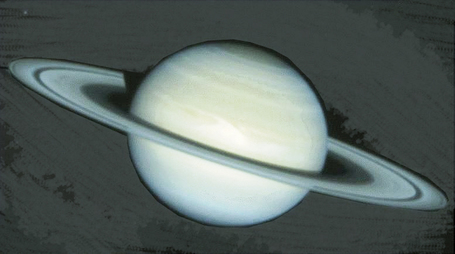
Saturn
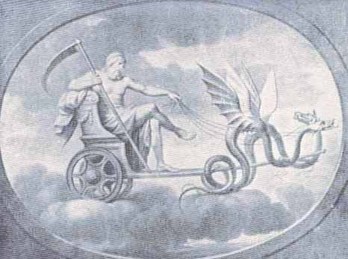
Cronos
Saturn was really a nature God, and one of his festivities, Saturnalia, was the victimized holiday that was overridden and slyly transformed into Christmas.
Cronos, it is worth noting, is the only Titan for whom a planet is named. Besides Uranus, his father, but all the rest of the planetary Gods are of the generation below Cronos. A rebellious lot are they.
But Saturn's ongoing legacy mostly associated with sadness and depression. To be depressed is to be "in Saturn," and a chronically depressed person is known as a "Child of Saturn." Saturn, being an "old man" (older generation) is the God who presided over the Golden Age, and we have coined the term Golden Years (good old days) in reference to him. When a person laments the loss of days gone by, Cronos is being called upon. A depressed person sometimes thinks that all opportunities are past and that there is nothing left for the present or the future. Saturn, too, has a wistfulness for days gone by.*** Quote: "These thoughts and feelings, sad as they are, favor the soul's desire to be both in time and in eternity, and so in a strange way they can be pleasing." Thomas Moore, Care of the Soul (More about Moore later on.)
At his core, though, Saturn was really a nature God, and one of his festivities, Saturnalia, was the victimized holiday that was overridden and slyly transformed into Christmas.
Fun Facts: Cronos is the a generation Titan, born of Gaia (Mother Earth) and Uranus (Father Sky), who made the bold life choice to sever his father's (Caelus's) penis and cast it into the sea, leading to the birth of Venus. His sickle was his weapon. (One can easily see why he might look back wistfully! What is there left to do in life once you've done something like that?)
Saturn was really a nature God, and one of his festivities, Saturnalia, was the victimized holiday that was overridden and slyly transformed into Christmas.
Cronos, it is worth noting, is the only Titan for whom a planet is named. Besides Uranus, his father, but all the rest of the planetary Gods are of the generation below Cronos. A rebellious lot are they.
But Saturn's ongoing legacy mostly associated with sadness and depression. To be depressed is to be "in Saturn," and a chronically depressed person is known as a "Child of Saturn." Saturn, being an "old man" (older generation) is the God who presided over the Golden Age, and we have coined the term Golden Years (good old days) in reference to him. When a person laments the loss of days gone by, Cronos is being called upon. A depressed person sometimes thinks that all opportunities are past and that there is nothing left for the present or the future. Saturn, too, has a wistfulness for days gone by.*** Quote: "These thoughts and feelings, sad as they are, favor the soul's desire to be both in time and in eternity, and so in a strange way they can be pleasing." Thomas Moore, Care of the Soul (More about Moore later on.)
At his core, though, Saturn was really a nature God, and one of his festivities, Saturnalia, was the victimized holiday that was overridden and slyly transformed into Christmas.
Fun Facts: Cronos is the a generation Titan, born of Gaia (Mother Earth) and Uranus (Father Sky), who made the bold life choice to sever his father's (Caelus's) penis and cast it into the sea, leading to the birth of Venus. His sickle was his weapon. (One can easily see why he might look back wistfully! What is there left to do in life once you've done something like that?)

ASTROLOGY:
Saturn's sickle or scythe
Saturn's sickle or scythe
us
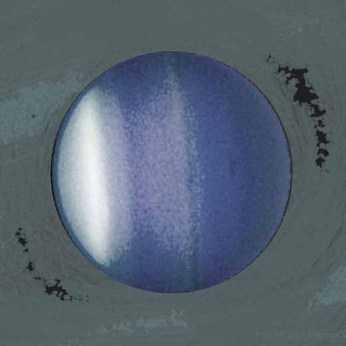
Uranus
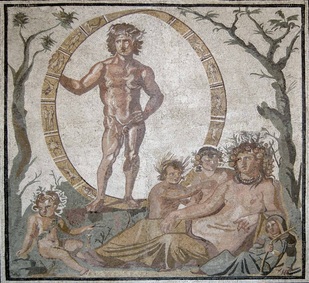
Caelus
Uranus is a primal Sky God thought of as the counterpart to Gaia, Mother Earth.
Interestingly, Uranus represents space itself and has the unique characteristics of being both a "God who dwells" and the Dwelling itself. Uranus is the earth, the sea, the sky, the world and the cosmos, but he still shows up as a God. I think that is a pretty crucial metaphor for examining our own existence.
Fun Facts: Uranus, being the father of Cronos, grandfather of Zeus, was the original owner of the Penis-Flung-Into-The-Sea that begat Venus.
I read that the Roman philosopher/politician Cicero asserted that the meaning behind this idea is that the "heavenly aether fire-seed" that generates all things does not require the petty regenerative powers of man for the Universe to sustain itself (it proceeds without us). To steal from a blockbuster movie that I enjoyed very much, "Nature finds a way."
Isn't mythology fun?! It is these types of creation myths that leads me to believe that all things are true---mythology, faerie tales, folk stories---I mean, you can't make this stuff up! Truth is stranger than fiction..
Uranus is a primal Sky God thought of as the counterpart to Gaia, Mother Earth.
Interestingly, Uranus represents space itself and has the unique characteristics of being both a "God who dwells" and the Dwelling itself. Uranus is the earth, the sea, the sky, the world and the cosmos, but he still shows up as a God. I think that is a pretty crucial metaphor for examining our own existence.
Fun Facts: Uranus, being the father of Cronos, grandfather of Zeus, was the original owner of the Penis-Flung-Into-The-Sea that begat Venus.
I read that the Roman philosopher/politician Cicero asserted that the meaning behind this idea is that the "heavenly aether fire-seed" that generates all things does not require the petty regenerative powers of man for the Universe to sustain itself (it proceeds without us). To steal from a blockbuster movie that I enjoyed very much, "Nature finds a way."
Isn't mythology fun?! It is these types of creation myths that leads me to believe that all things are true---mythology, faerie tales, folk stories---I mean, you can't make this stuff up! Truth is stranger than fiction..
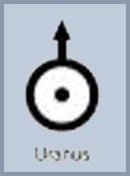
ASTROLOGY:
This symbol for Uranus were intended to represent the newly discovered metal platinum ; since platinum (known also as white GOLD)was found by chemists mixed with IRON, the symbol for platinum combines the alchemical symbols for iron and gold.
Little bit more complicated than the others!
This symbol for Uranus were intended to represent the newly discovered metal platinum ; since platinum (known also as white GOLD)was found by chemists mixed with IRON, the symbol for platinum combines the alchemical symbols for iron and gold.
Little bit more complicated than the others!
nine
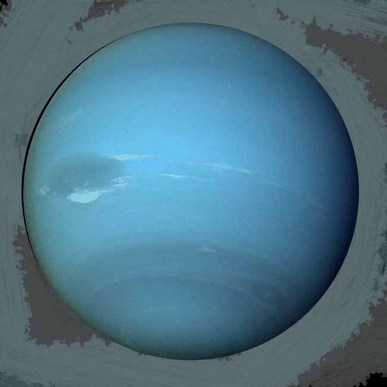
Neptune
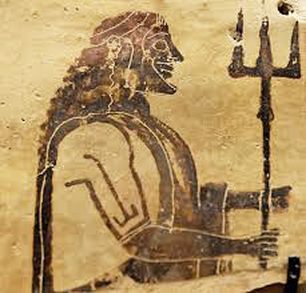
Poseidon
Already mentioned as one of the three brothers who divvied up the Universe with Zeus and Hades, Poseidon chose the realm of the sea.
Even though Zeus was the acknowledged leader of the Gods and Hades the king of the Underworld, Neptune was able to exert a unique power and influence over his brothers that no other God could wield He embodied the unpredictable nature of the the sea and is quite dramatic in his stories. However, once having offended Zeus he was stripped of his powers and sent to work, along with Apollo, for a human King. I find the idea of a hiatus from immortality another useful metaphor in examining out own lives.
Neptune's got a tricked out ride: an ocean chariot driven by gigantic seahorses and dwells on the Island of Atlantis. Works wonders with the ladies...
Fun Facts: Neptune mated with Medusa and when Perseus cut her head off, Pegasus sprang forth. (Not exactly Clash of the Titans, I know, but the story goes he was gifted with winged shoes. Release the Kracken!)
Already mentioned as one of the three brothers who divvied up the Universe with Zeus and Hades, Poseidon chose the realm of the sea.
Even though Zeus was the acknowledged leader of the Gods and Hades the king of the Underworld, Neptune was able to exert a unique power and influence over his brothers that no other God could wield He embodied the unpredictable nature of the the sea and is quite dramatic in his stories. However, once having offended Zeus he was stripped of his powers and sent to work, along with Apollo, for a human King. I find the idea of a hiatus from immortality another useful metaphor in examining out own lives.
Neptune's got a tricked out ride: an ocean chariot driven by gigantic seahorses and dwells on the Island of Atlantis. Works wonders with the ladies...
Fun Facts: Neptune mated with Medusa and when Perseus cut her head off, Pegasus sprang forth. (Not exactly Clash of the Titans, I know, but the story goes he was gifted with winged shoes. Release the Kracken!)
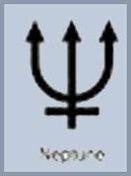
ASTROLOGY:
Neptune's trident
Neptune's trident
pizza-pies
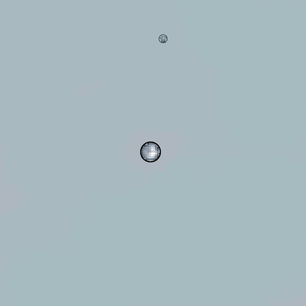
Pluto (134340 Pluto)
Discovered in 1930, Pluto was originally classified as the Ninth Planet in our Solar System. Since then, with the discovery, identification and collection of new information of other eccentric icy objects swirling around in a similar area, Pluto's status as a planet became questionable. As I understand it, the straw that broke the camel's back--as it were--was with the observation of a new icy body (later named Eris) that was identical to Pluto in every way except it was larger. This dawning comprehension of what seemed to be a possibly endless parade of icy "planet-like" things circling our Sun (our Sun!), caused the IAU (International Astronomical Union) to create a formal definition of "planet"---thus excluding Pluto forever!!! Booooo and hissssssss!! Not cool, International Astronomical Unionists!!! Even though it is officially reclassified as a "dwarf planet" (now known as a Plutoid) I am not the only one sad to see Pluto kicked off the roster, and there were and still are a number of scientists who felt it should have maintained planetary status.
Pluto will always be my "Pizza-Pie"....
Discovered in 1930, Pluto was originally classified as the Ninth Planet in our Solar System. Since then, with the discovery, identification and collection of new information of other eccentric icy objects swirling around in a similar area, Pluto's status as a planet became questionable. As I understand it, the straw that broke the camel's back--as it were--was with the observation of a new icy body (later named Eris) that was identical to Pluto in every way except it was larger. This dawning comprehension of what seemed to be a possibly endless parade of icy "planet-like" things circling our Sun (our Sun!), caused the IAU (International Astronomical Union) to create a formal definition of "planet"---thus excluding Pluto forever!!! Booooo and hissssssss!! Not cool, International Astronomical Unionists!!! Even though it is officially reclassified as a "dwarf planet" (now known as a Plutoid) I am not the only one sad to see Pluto kicked off the roster, and there were and still are a number of scientists who felt it should have maintained planetary status.
Pluto will always be my "Pizza-Pie"....
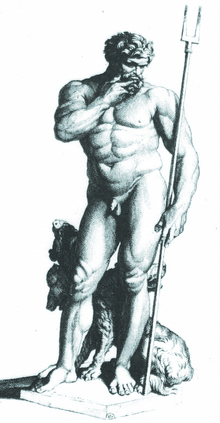
Hades
Hades, brother to Zeus and Poseidon, was given the Underworld as his charge., A super heavy hitter and a bona fide ruler of the Universe, Pluto does not disappoint. His stories are dramatic and exciting AND he has a three headed dog. Pluto has that stark allure that many "darker dwelling" Gods and Goddesses garner.
In the same spirit of "speak of the devil (and he doth appear)" folks tried to avoid using the name Hades and instead referred to him as Pluto. He was honored often, as you might well imagine a God of the Underworld might be honored.
Fun Facts: Hades is NOT an ancient version of Satan. He did not trick or tempt people away from their fates--he was just there when it was over. And, besides one teeny-tiny-barely-worth-mentioning infraction, he was a faithful and loyal husband to Persephone.. (Although, Persephone may have strayed--I base that only on this particular....um.... rendering of Pluto.)
Hades, brother to Zeus and Poseidon, was given the Underworld as his charge., A super heavy hitter and a bona fide ruler of the Universe, Pluto does not disappoint. His stories are dramatic and exciting AND he has a three headed dog. Pluto has that stark allure that many "darker dwelling" Gods and Goddesses garner.
In the same spirit of "speak of the devil (and he doth appear)" folks tried to avoid using the name Hades and instead referred to him as Pluto. He was honored often, as you might well imagine a God of the Underworld might be honored.
Fun Facts: Hades is NOT an ancient version of Satan. He did not trick or tempt people away from their fates--he was just there when it was over. And, besides one teeny-tiny-barely-worth-mentioning infraction, he was a faithful and loyal husband to Persephone.. (Although, Persephone may have strayed--I base that only on this particular....um.... rendering of Pluto.)

ASTROLOGY:
Monogram for Pluto ("PL")
Monogram for Pluto ("PL")
*The Greek and the Roman gods and goddesses, while similar, are not identical. But in this day and age, it is not very relevant anymore and they have been "successfully" merged into one. So, for the sake of brevity, I am going to treat them as such.
**


